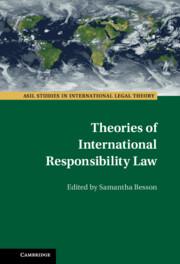Book contents
- Theories of International Responsibility Law
- ASIL Studies in International Legal Theory
- Theories of International Responsibility Law
- Copyright page
- Contents
- Contributors
- Preface
- Theorizing International Responsibility Law, an Introduction
- Part I International Responsibility of Public Institutions: Public and/or Private?
- Part II International Responsibility of Public Institutions: Collective and/or Individual?
- Part III International Responsibility of Public Institutions: Fault-based or Not?
- 9 Responsibility or Liability
- 10 Causation, Fault and Function in the Rules of Attribution
- 11 Time Travel in the Law of International Responsibility
- Part IV Responsibility of Public Institutions: A World Tour
- Index
10 - Causation, Fault and Function in the Rules of Attribution
from Part III - International Responsibility of Public Institutions: Fault-based or Not?
Published online by Cambridge University Press: 01 September 2022
- Theories of International Responsibility Law
- ASIL Studies in International Legal Theory
- Theories of International Responsibility Law
- Copyright page
- Contents
- Contributors
- Preface
- Theorizing International Responsibility Law, an Introduction
- Part I International Responsibility of Public Institutions: Public and/or Private?
- Part II International Responsibility of Public Institutions: Collective and/or Individual?
- Part III International Responsibility of Public Institutions: Fault-based or Not?
- 9 Responsibility or Liability
- 10 Causation, Fault and Function in the Rules of Attribution
- 11 Time Travel in the Law of International Responsibility
- Part IV Responsibility of Public Institutions: A World Tour
- Index
Summary
This chapter raises the question whether attribution of wrongful acts to the State is based on ‘objective’ causal chains or ‘subjective’ mental states. It argues that attribution of conduct to the State is not primarily causal or fault-based. First, it shows that several of the Articles on the Responsibility of States for Internationally Wrongful Acts cannot be understood in terms of causation or fault. Second, it argues that causal and fault-based theories of attribution are either circular or incomplete. Instead, the chapter claims, the logic of attribution is primarily functional. The rules of attribution converge around the central principle that an act of State is an act performed in the service of a State function, such as defence or detention. Functional attribution is best understood as ‘intersubjective’: it is determined not by objective causal chains or by subjective mental states, but by shared ideas about the functions of the State and what it means to perform them. The functional character of the rules of attribution allows them to adapt to economic and technological changes, such as the growth of corporations and the development of autonomous weapons.
Keywords
- Type
- Chapter
- Information
- Theories of International Responsibility Law , pp. 229 - 251Publisher: Cambridge University PressPrint publication year: 2022

